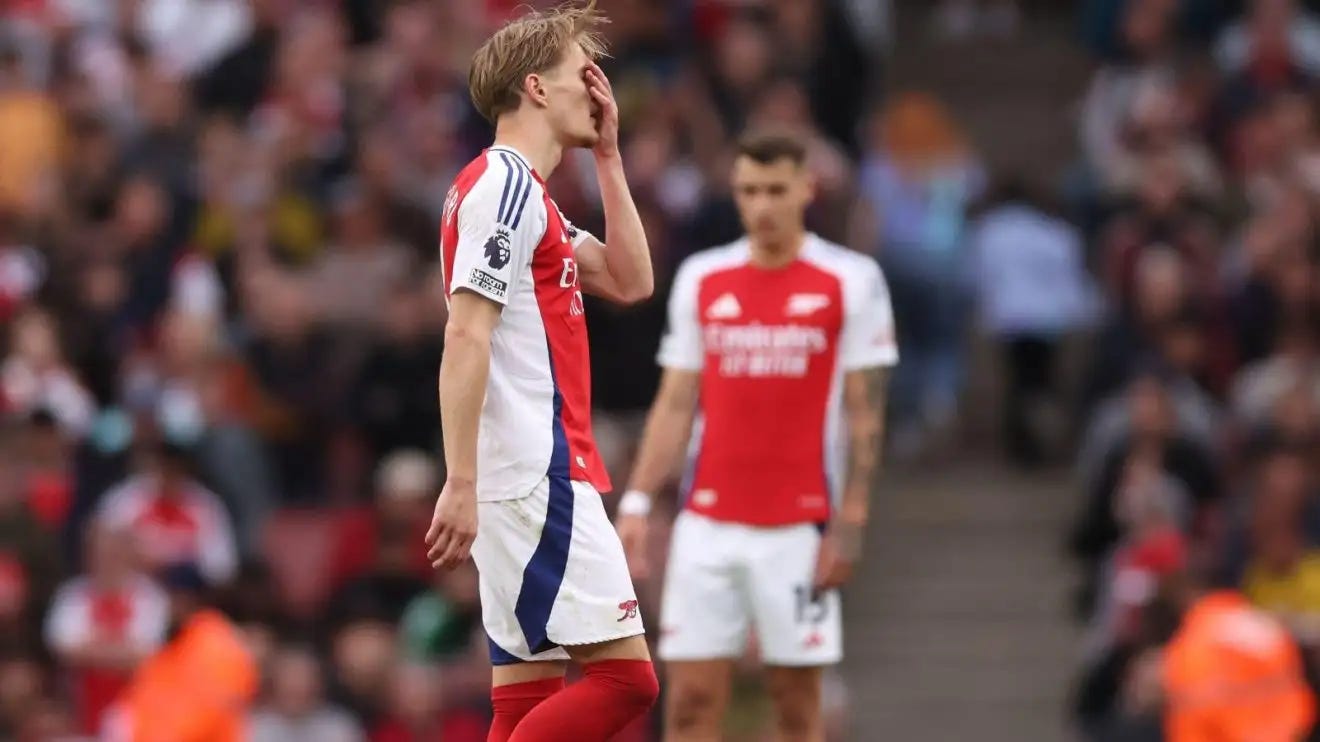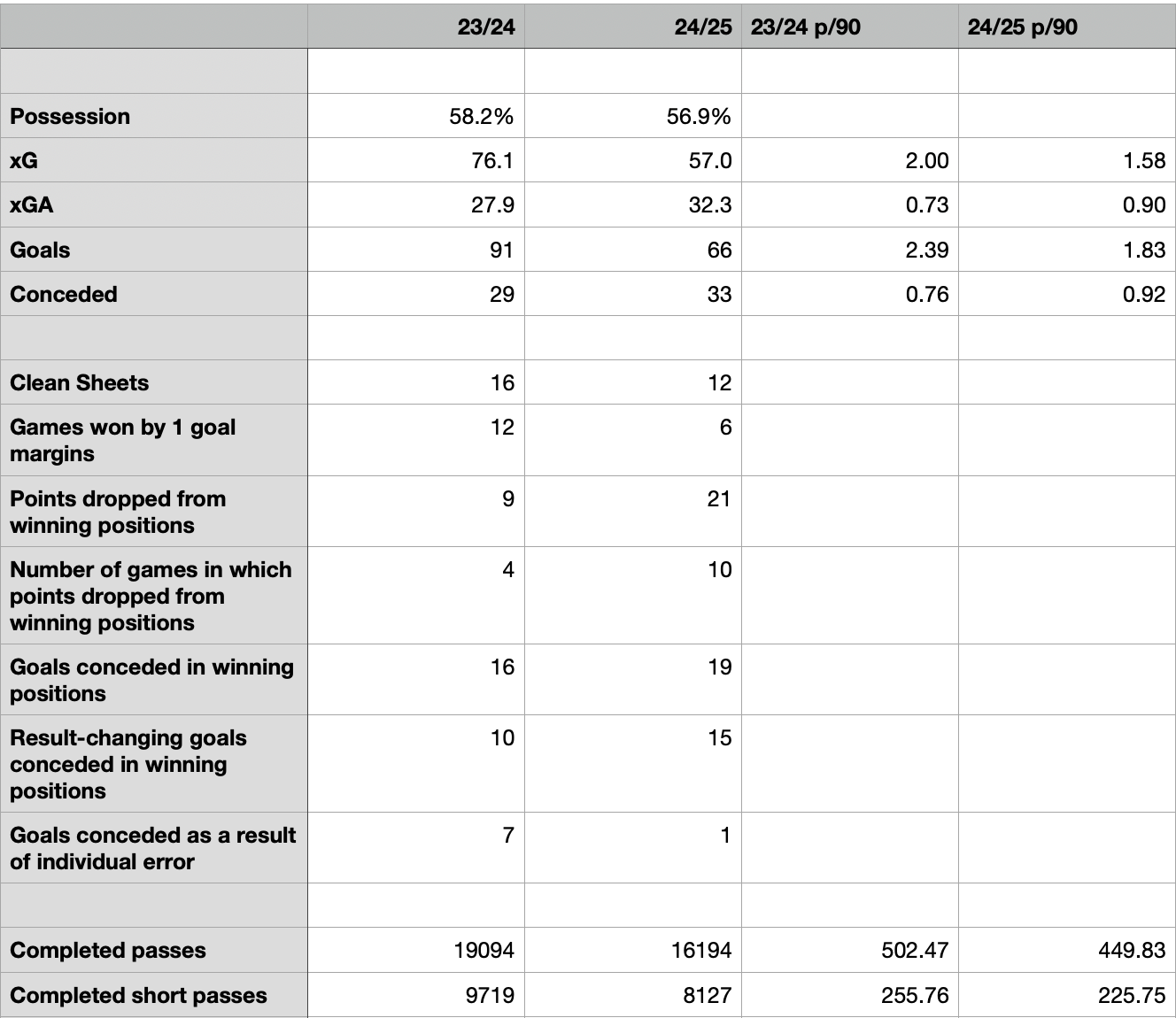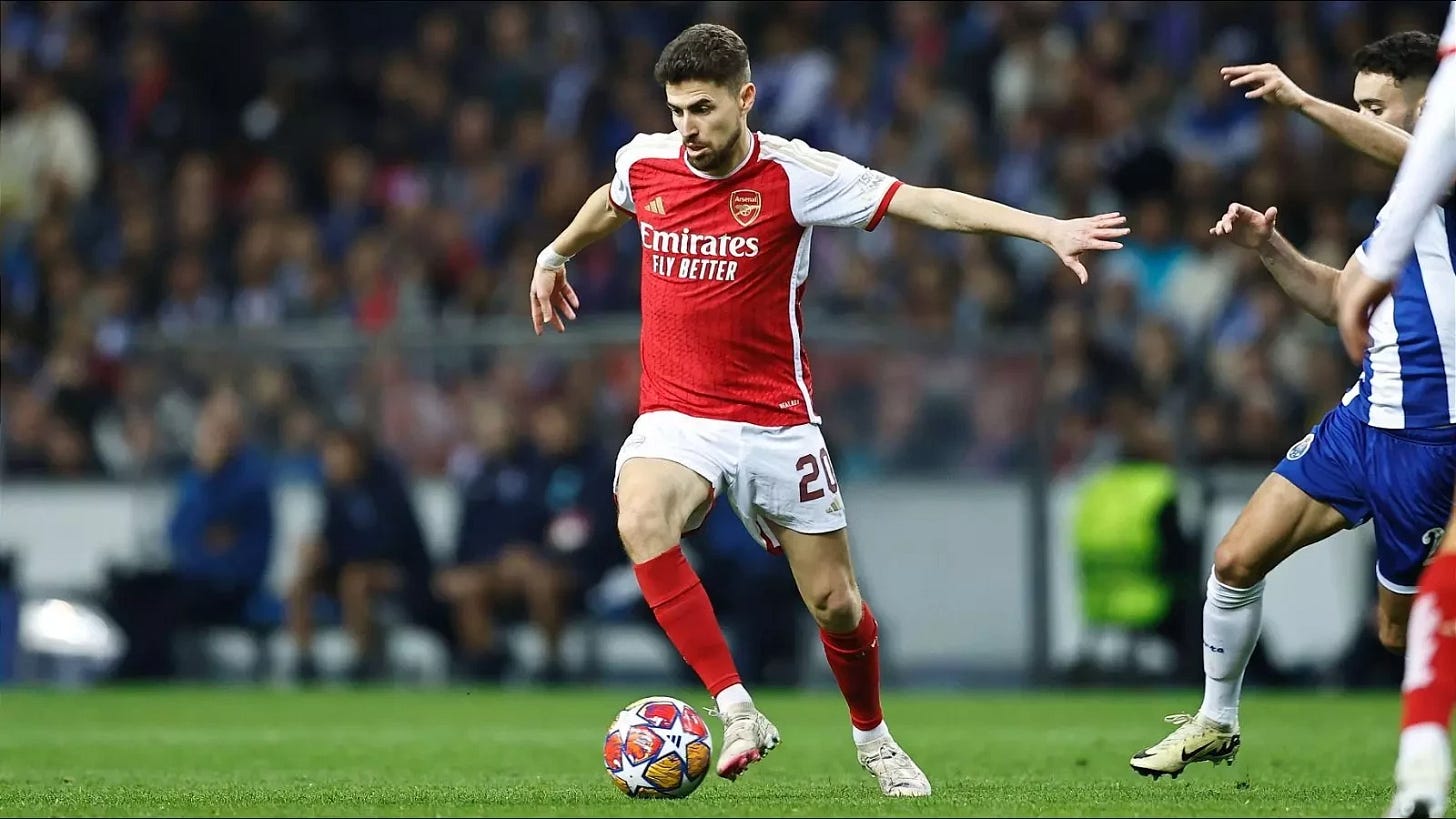Inaction Has Consequences: An Arsenal Season Review
Where Arsenal's 23/24 promised so much, 24/25 underdelivered spectacularly. Why did it go awry, what positives can be taken, and what happens next?
Arsenal’s 24/25 has been underpinned by a disastrous combination. The first element is poor squad planning, which has hit them squarely in the face at almost every possible point. The second is Murphy’s Law: anything that could have gone wrong has emphatically gone wrong.
While Champions League qualification and final league position are yet to be entirely confirmed, Arsenal’s season came to its functional end after the Champions League semi final second leg loss to Paris Saint-Germain. The tie was defining for Arsenal’s season, for reasons far beyond whether they were going to finally earn a trophy again.
With the league long written-off, it forced them to confront important questions: have the team progressed at all? Are they capable of excelling next year? Or has 24/25 been a complete waste of time?
Despite the result, Arsenal’s performance made clear that the answers are two resounding ‘yes’-es, and a merciful ‘no’. It was a huge test for Mikel Arteta’s nouse, every player’s character, and just how ready they are to compete with the biggest and best outside of England. With one notable exception, every player chose to stand up and be counted, and Arteta’s setup saw the side put in one of its best showings of the season.
The second leg, along with the recovery after the opening 20 minutes of the first, showed a team ready to make major strides. And it really isn’t far away, as much as the shambolic league season paints that picture. Although there’s a sizeable amount of work, it’s firmly in their hands to ensure that this league season can be the aberration, and the Champions League run is just the start.
But before then, the season needs analysing. Where did it all fall apart in 24/25?
Squad planning and injuries
While Arsenal’s squad has endured great misfortune with injuries, there are many lessons to be taken about reaping what you sow. The issues around Arsenal’s attack building are covered in greater depth here, but in short: the club failed to make real additions to the forward line, and a visibly exhausted Kai Havertz and Bukayo Saka each eventually broke down with the first major injuries of their careers.
Mikel Merino has deputised extremely admirably, but having Gabriel Jesus as the first point of cover for both players was calamitous. Even signing just one of a striker or winger in summer 2024 could have been hugely impactful, but in the end, Raheem Sterling arrived on loan.
That Arsenal found themselves scrambling on deadline day for a player deemed dispensable by a far worse team speaks to appalling attacking planning. By that point, the idea of Sterling was sensible enough, given his experience and (former) quality, but there is little redeeming just how horribly it has gone.
Riccardo Calafiori is undoubtedly extremely talented, but has struggled for fitness, for which his record gave plenty of warning. The signs were also there for Alex Zinchenko. The same is true, to a far more extreme extent, with Takehiro Tomiyasu. Whether those defenders’ injuries were significant in Gabriel Magalhaes’ hamstring tear is impossible to know, but they are unlikely to have helped.
With that, though, there are some things beyond control. Club captain Martin Ødegaard missing two months with an injury sustained on international duty and struggling for form the rest of the season. Merino, signed in-part for his impeccable fitness record, fracturing his shoulder in his first training session. Ben White needing surgery and missing three months.
In some cases, it really has just been horrible luck. In others, lack of action in recruitment created a storm of deeper issues. There has also been a lesson there in making your own luck — where the defence has suffered injuries, it has remained largely functional thanks to a strong selection of talented and versatile players. Where the forwards suffered injuries, the collective struggled significantly due to fundamentally insufficient depth.
Referees
It feels facile to lay the blame for a league season that has been below expectations in so many ways at the door of PGMOL, but there is no accurate reflection on the year without mentioning them. From inexplicable red cards for laws never enforced again to penalties conceded for incidents never seen before or since, it has been an exhausting and seemingly endless year of refereeing nonsense.
In turn, there have been numerous moments where Arsenal’s approach to those bizarre calls has ensured they have suffered more for them. It’s best not to dwell, but it’s hard not to. Really, fixing that is far beyond anyone at the club’s remit, and certainly far removed from mine.
Fundamentally Not Being Good Enough
Arsenal set a remarkable standard for themselves in the 23/24 season. Along with earning an exceptional 89 points, the dominance and control they exerted on games was phenomenal. On and off the ball, they were a technical and physical juggernaut, defensively near-impenetrable, and slick and layered in attack.
Little, if any, of that remained true in 24/25. The number of games they really controlled was minimal. There have been huge issues defending leads, with 21 points dropped from winning positions across 10 matches. The stats below scratch the surface, but are demonstrative of where the issues have been this season compared to last, and what has to change.
In short summary: Arsenal have been worse at defending, worse at creating chances, worse at taking chances, worse at keeping the ball, worse at holding leads and, with the significant reduction in short passes, in an enforced style shift for which they were not remotely prepared.
The biggest explainer for these changes, the various injuries and suspensions notwithstanding, is the only area of the team with a change in starter: midfield. Jorginho’s turn in the second half of the 23/24 season brought an assurance and calm, and raised the level. He has evidently declined physically very quickly, but has been deeply missed in the side.
This change in fortunes did not come out of nowhere. In the final five games of 23/24, when Jorginho was replaced by a Premier League footballer in his 30s, Arsenal were visibly a different and far worse unit. Arsenal looked more like their 22/23 selves, winning games through offensive power rather than control, and matches were far more end-to-end. Somehow Arteta was not put off by what he saw then, and chose to run with that midfield setup into the new season.
The kind of territorial dominance Arsenal exhibited in 23/24 lives and dies through intelligent build-up on the ball and a bomb-proof shape off it. That decline in short passes shows the need for a metronome figure in front of the defence, as does going from a player in Jorginho, who averaged 85 touches p/90 in 23/24, to his alternative, who sits on 71.
You can have all the progressive passes in the world, if a possession-built side is unable to exert a strangling dominance through intelligent use of the ball, they are likely to look… well, like the odd, congealed mess Arsenal have over the 24/25 season. And that is only rendered worse without excellent positioning in that defensive midfield role.
Around that, White’s prolonged absence was really felt. Jurriën Timber did a frankly remarkable job deputising after having missed all of 23/24, but he does not offer the same presence going forward as White, whose combinations with Ødegaard and Saka were huge in the team’s ability to break oppositions down.
The number of points dropped from winning positions speaks for itself. Repeatedly, Arsenal have failed to kill games, or see out narrower margins as they did last season. The defensive solidity has taken a massive hit, and quite obviously not as a result of increased errors, which speaks to serious structural issues.
What next?
The bad news is that maelstrom of disaster has ensured a complete write-off of a league season. The good news is that, through the continued record against big sides and the Champions League run, there was a real reminder of just what this team is capable of doing, and a basis for real hope for next season.
Plugging those gaps in the squad is the biggest step. With all the difficulties around injuries and the misery of referees, all of the external factors would have been far more manageable with a sufficient squad. From there, it’s about Arteta remembering what made the most formidable version of his Arsenal so difficult to play against.
Sterile possession is no use, but dominating the ball and picking ways through determined blocks steadily goes a long way further than doing nothing other than trying to pass through them at every stage. Arsenal have to improve at drawing teams out and strangling them in and out of possession, and managing that would be transformative for their open play chance creation.
The lessons for those in charge off the pitch are the same for those on it: be decisive, and take everything you can into your own hands; the football Gods aren’t going to save you, but you can take care of yourself.








